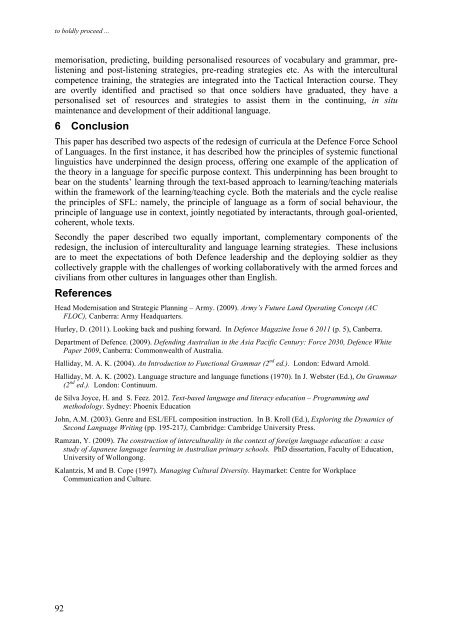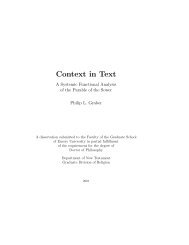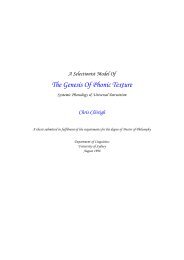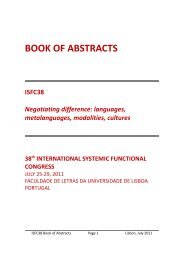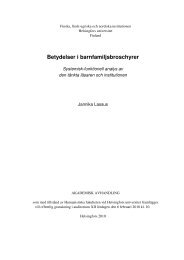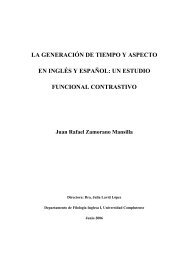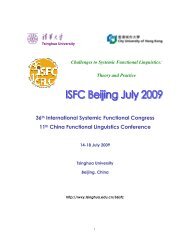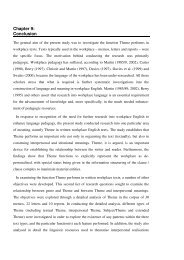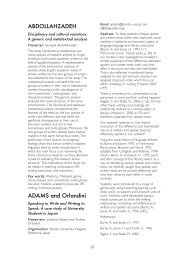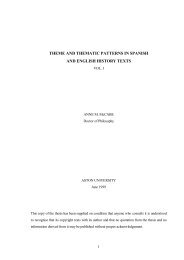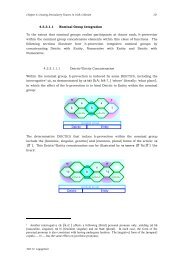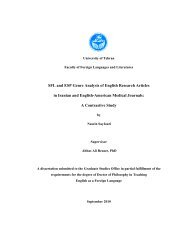to boldly proceed ...memorisation, predicting, building personalised resources of vocabulary and grammar, prelisteningand post-listening strategies, pre-reading strategies etc. As with <strong>the</strong> interculturalcompetence training, <strong>the</strong> strategies are integrated into <strong>the</strong> Tactical Interaction course. Theyare overtly identified and practised so that once soldiers have graduated, <strong>the</strong>y have apersonalised set of resources and strategies to assist <strong>the</strong>m in <strong>the</strong> continuing, in situmaintenance and development of <strong>the</strong>ir additional language.6 ConclusionThis paper has described two aspects of <strong>the</strong> redesign of curricula at <strong>the</strong> Defence Force Schoolof Languages. In <strong>the</strong> first instance, it has described how <strong>the</strong> principles of systemic functionallinguistics have underpinned <strong>the</strong> design process, offering one example of <strong>the</strong> application of<strong>the</strong> <strong>the</strong>ory in a language for specific purpose context. This underpinning has been brought tobear on <strong>the</strong> students’ learning through <strong>the</strong> text-based approach to learning/teaching materialswithin <strong>the</strong> framework of <strong>the</strong> learning/teaching cycle. Both <strong>the</strong> materials and <strong>the</strong> cycle realise<strong>the</strong> principles of SFL: namely, <strong>the</strong> principle of language as a form of social behaviour, <strong>the</strong>principle of language use in context, jointly negotiated by interactants, through goal-oriented,coherent, whole texts.Secondly <strong>the</strong> paper described two equally important, complementary components of <strong>the</strong>redesign, <strong>the</strong> inclusion of interculturality and language learning strategies. These inclusionsare to meet <strong>the</strong> expectations of both Defence leadership and <strong>the</strong> deploying soldier as <strong>the</strong>ycollectively grapple with <strong>the</strong> challenges of working collaboratively with <strong>the</strong> armed forces andcivilians from o<strong>the</strong>r cultures in languages o<strong>the</strong>r than English.ReferencesHead Modernisation and Strategic Planning – Army. (2009). Army’s Future Land Operating Concept (ACFLOC), Canberra: Army Headquarters.Hurley, D. (2011). Looking back and pushing forward. In Defence Magazine Issue 6 2011 (p. 5), Canberra.Department of Defence. (2009). Defending Australian in <strong>the</strong> Asia Pacific Century: Force 2030, Defence WhitePaper 2009, Canberra: Commonwealth of Australia.Halliday, M. A. K. (2004). An Introduction to <strong>Functional</strong> Grammar (2 nd ed.). London: Edward Arnold.Halliday, M. A. K. (2002). Language structure and language functions (1970). In J. Webster (Ed.), On Grammar(2 nd ed.). London: Continuum.de Silva Joyce, H. and S. Feez. 2012. Text-based language and literacy education – Programming andmethodology. Sydney: Phoenix EducationJohn, A.M. (2003). Genre and ESL/EFL composition instruction. In B. Kroll (Ed.), Exploring <strong>the</strong> Dynamics ofSecond Language Writing (pp. 195-217), Cambridge: Cambridge University Press.Ramzan, Y. (2009). The construction of interculturality in <strong>the</strong> context of foreign language education: a casestudy of Japanese language learning in Australian primary schools. PhD dissertation, Faculty of Education,University of Wollongong.Kalantzis, M and B. Cope (1997). Managing Cultural Diversity. Haymarket: Centre for WorkplaceCommunication and Culture.92
Papers from <strong>the</strong> 39th ISFCSFL-based text analysis for translator educationMira Kim and Edward McDonaldThe University of New South WalesAbstractThis paper presents a case study of <strong>the</strong> use of <strong>Systemic</strong> <strong>Functional</strong> Linguistics (SFL) as a tool in educatingtranslators. SFL has influenced a number of both <strong>the</strong>oretical and descriptive translation studies since <strong>the</strong> 1960s(e.g. Catford (1965); House (1977/1997) and has enjoyed a position of particular “prominence” in <strong>the</strong> field since“<strong>the</strong> early 1990s” (Munday 2008: 13) (e.g. Hatim and Mason (1990, 1997); Bell (1991); Baker (1992/2011);Munday (2001/2008); Trosborg (2002); and Steiner (2002, 2004). However, what has not yet been rigorouslyexplored is its application to text analysis in training translators and interpreters. The current research derivesfrom a postgraduate program in interpreting and translation studies featuring English as <strong>the</strong> common languagealongside a range of European and Asian languages such as Chinese, French, German, Indonesian, Japanese,Korean, Russian, and Spanish. It describes a dedicated course in text analysis for translation which draws on anSFL framework to equip students with tools for understanding <strong>the</strong> links between contextual and textual variables(genre, register) and lexicogrammatical patterning, and <strong>the</strong>n apply those tools comparatively across languages.Based on our classroom data, we aim to put forward a model that can be adopted for similar multilingualeducational contexts, and discuss <strong>the</strong> pedagogical advantages and limitations of applying SFL for this purpose.1 Contributions of <strong>Systemic</strong> <strong>Functional</strong> Linguistics to TranslationStudiesHalliday’s <strong>Systemic</strong> <strong>Functional</strong> Linguistics (SFL) has been used in a number of languagerelatedstudies such as language typology (e.g. Caffarel et al. 2004) and discourse analysis(Martin & Rose 2003/2007), as well as professionally oriented disciplines such as medicine(e.g. Sarangi and Roberts 1999), business and finance (e.g. Burns and Moore 2008), andeducation (e.g. Hasan and Williams 1996). It has also provided “methodological refinement”for <strong>the</strong> field of translation studies which combines a crucial focus on language with a strongprofessional orientation (Steiner 2005: 486). There are some good reasons for <strong>the</strong> wideapplication of SFL. The key reason can be found in Halliday’s continued efforts to make ameaningful link between <strong>the</strong>ory and practice, as acknowledged by Yallop in <strong>the</strong> context oftranslation studies (1987: 347). In a recent interview Halliday explained that he “wanted anaccount of language which would be serviceable in <strong>the</strong>se contexts [where problems areresolving <strong>the</strong>mselves into problems of language]…but which would be robust enough to learnfrom <strong>the</strong>se challenges and to continue to evolve while taking on broad new findings” (Burns2008: 124). Ano<strong>the</strong>r major reason concerns how language is viewed in SFL: as a meaningmakingresource through which people interact with each o<strong>the</strong>r in given situational andcultural contexts; and where <strong>the</strong> main analytical interest lies in exploring how language isused to construe meaning within local as well as global contexts. It is thus a common practicein SFL to study <strong>the</strong> lexicogrammar, concerned with meaning as realized by wordings at <strong>the</strong>clause level, in relation to <strong>the</strong> semantics, concerned with meanings at <strong>the</strong> text level in relationto <strong>the</strong>ir discourse contexts, and vice versa. The centrality of meaning provides core linksbetween SFL and translation studies in particular. It enables translators ‘to interpret meaningat a higher abstract level (semantic) and to analyze how it is realized at a lower level ofwording’ (Burns et al 2009: xxx). Newmark (1987:293) suggests:Since <strong>the</strong> translator is concerned exclusively and continuously with meaning, it is not surprising thatHallidayan linguistics which sees language primarily as a meaning potential should offer itself as aserviceable tool for determining <strong>the</strong> constituent parts of a source language text and its network ofrelations with its translation.93


